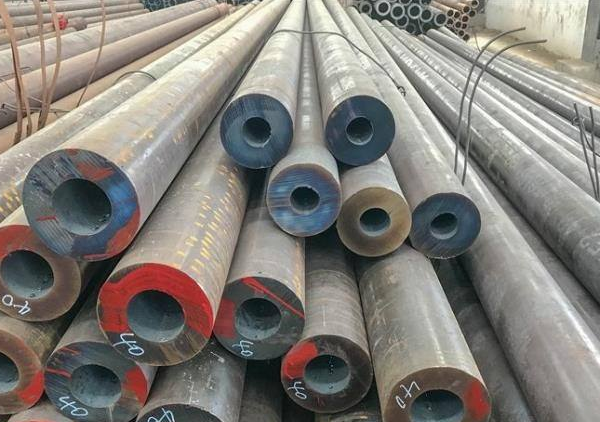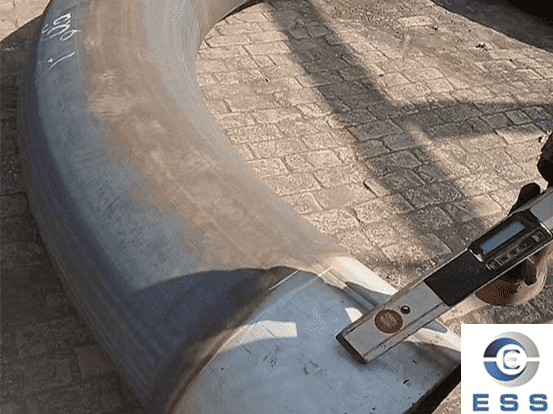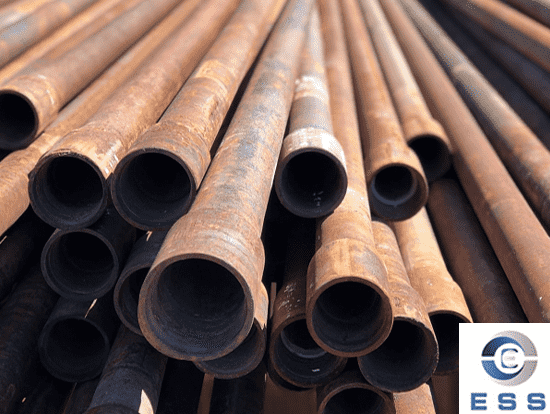What Is Thick Wall Steel Pipe?
Thick-walled steel pipe, the steel pipe
with the ratio of the outer diameter of the steel pipe to the wall thickness is
less than 20 is called the thick-walled steel pipe. Mainly used as petroleum
geological drill
pipe, cracking pipe for petrochemical industry, boiler pipe, bearing
pipe and high-precision structural pipe for automobile, tractor, aviation, etc.
The Difference Between Thick-Walled
Steel Pipe And Thin-Walled Steel Pipe
The biggest difference between thick-walled
steel pipes and thin-walled steel pipes is the thickness of the steel pipe
wall. Generally speaking, thin-walled steel pipes are cold-drawn technology,
while thick-walled steel pipes and thick-walled steel pipes generally use
hot-rolling technology, if they are distinguished by units of measure.
Then, it is generally believed that the
wall thickness/pipe diameter equal to 0.02 is the watershed between
thick-walled steel pipes and thin-walled steel pipes, those with wall
thickness/pipe diameter less than 0.02 are thin-walled steel pipes, and those
larger than 0.02 are thick-walled steel pipes.
In terms of use, thin-walled steel pipes
Wall steel pipes are mostly used on pipes. Thick-walled steel pipes are mostly
used in blanks for hollow parts. Use on pressure-bearing and important
pipelines.

Take thick-walled seamless pipe as an
example. Thick-walled seamless pipe refers to seamless steel pipe with a large
wall thickness to outer diameter ratio (typically wall thickness ≥ 10mm or outer diameter/wall thickness ratio ≤ 10). Its core features include:
1. Seamless Structure
Formed in a single step through hot rolling
or cold drawing, it has no welds, eliminating the weak links of traditional seam
pipes.
2. High Strength
The increased wall thickness significantly
increases pressure bearing capacity. For example, the tensile strength of
thick-walled pipe can reach over 415 MPa under the ASTM A106 standard.
3. Diverse Materials
Common materials include carbon steel (such
as 20# and 45#), alloy steel (such as 16Mn), and stainless steel (such as 304
and 316), adapting to different environmental requirements.
Production Process of Thick Wall Seamless Pipe
1. Hot Rolling
The steel billet is heated to above 1200°C and then pierced and rolled. This process is suitable for
producing large-diameter (OD ≥ 200mm) and thick-walled
(wall thickness 20-100mm) pipes.
2. Cold Drawing
The steel pipe is drawn to the target size
at room temperature. This process offers higher precision (tolerance ±0.2mm), but the wall thickness is typically ≤40mm.
Materials for Thick-Walled Seamless
Pipes
1. Carbon Structural Steel Thick-Walled
Seamless Pipes
Material: Carbon is the primary alloying
element. Common grades include 20# and 45#.
Performance: Moderate strength, good
ductility and toughness, excellent weldability, and low cost.
Applications: Suitable for low-pressure
pipelines, mechanical structural components, and general engineering pipes
(such as water and gas pipelines).
2. Alloy Structural Steel Thick-Walled
Seamless Pipes
Material: Made from carbon steel with
alloying elements such as chromium, molybdenum, nickel, and manganese. Common
grades include 16Mn, 40Cr, 15CrMo, and 27SiMn.
Performance: High strength, high wear
resistance, and high or low temperature resistance. Mechanical properties can
be further enhanced through heat treatment (quenching and tempering).
Applications: High-pressure pipelines,
mechanical transmission components (such as drive shafts and hydraulic
cylinders), petrochemical equipment, and power plant boiler
pipes.
3. Stainless Steel Thick-Wall Seamless Pipe
Material: Chromium content ≥ 10.5%. Common grades include 304, 316, and 321. 316 boasts superior
corrosion resistance due to the addition of molybdenum.
Performance: Excellent corrosion resistance
(acid, alkali, and oxidation resistance), high-temperature resistance, and a
high-quality surface finish.
Applications: Corrosive environments such
as the chemical, pharmaceutical, food processing, and seawater treatment
industries, or high-temperature piping systems (e.g., boiler superheaters).
4. Specialty Thick-Wall Seamless Pipe
Low-Temperature Steel: such as 16MnDG,
suitable for low-temperature environments below -40°C
(e.g., LNG pipelines).
High-Pressure Boiler Steel: such as 20G and
12Cr1MoVG, resistant to high temperatures and pressures, used for main steam
piping in power plant boilers.
Pipeline Steel: such as X70 and X80,
high-strength and fatigue-resistant, used for long-distance oil and natural gas
pipelines.
Thick-Wall Seamless Pipe Specifications
|
Specifications (inches)
|
Pipe Diameter (mm)
|
Pipe Wall Thickness (mm)
|
|
2
|
60.3
|
5.54
|
|
3
|
88.9
|
5.49
|
|
4
|
114.3
|
6.02
|
|
5
|
141.3
|
6.55
|
|
6
|
168.3
|
7.11
|
|
8
|
219.1
|
8.18
|
|
10
|
273.1
|
9.27
|
|
12
|
323.9
|
10.31
|
|
14
|
355.6
|
11.13
|
|
16
|
406.4
|
12.7
|
|
18
|
457.2
|
14.27
|
|
20
|
508
|
15.09
|
Application of Thick Wall Seamless Pipe
Thick-walled steel pipes are mainly used in
water engineering, petrochemical industry, chemical industry, electric power
industry, agricultural irrigation, and urban construction.
For liquid transportation: water supply,
drainage.
For gas transportation: gas, steam,
liquefied petroleum gas.
For structural purposes: for piling pipes,
for bridges, for wharfs, roads, building structures, etc.
Summary
Thick-walled steel pipes offer high
strength and are widely used in various applications. When using them, it's
important to select the appropriate specifications and materials, and to adhere
to relevant regulations and safety procedures to ensure safety and a long
service life.













 Eastern Steel Manufacturing Co.,Ltd not only improve product production and sales services, but also provide additional value-added services. As long as you need, we can complete your specific needs together.
Eastern Steel Manufacturing Co.,Ltd not only improve product production and sales services, but also provide additional value-added services. As long as you need, we can complete your specific needs together.










